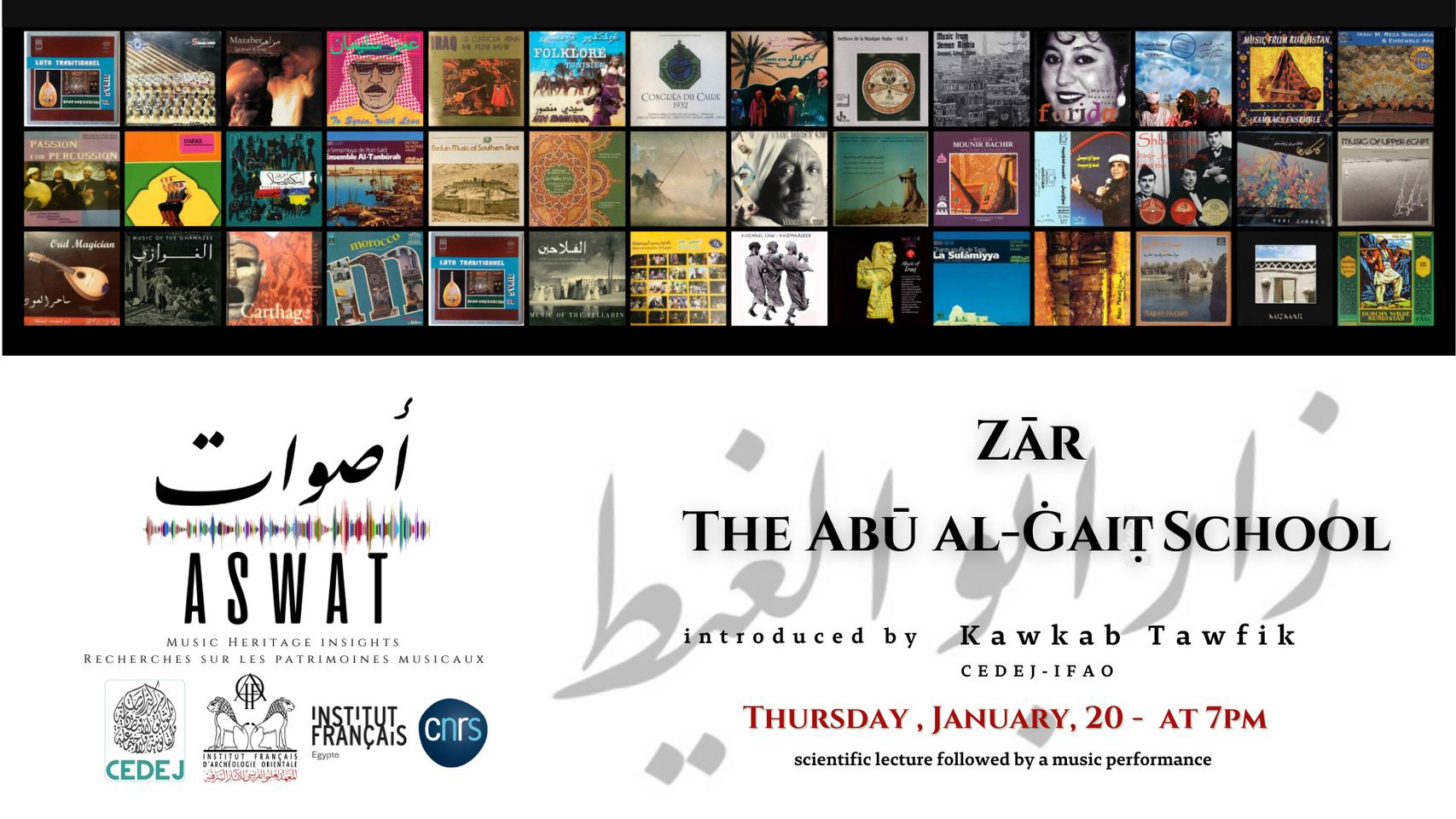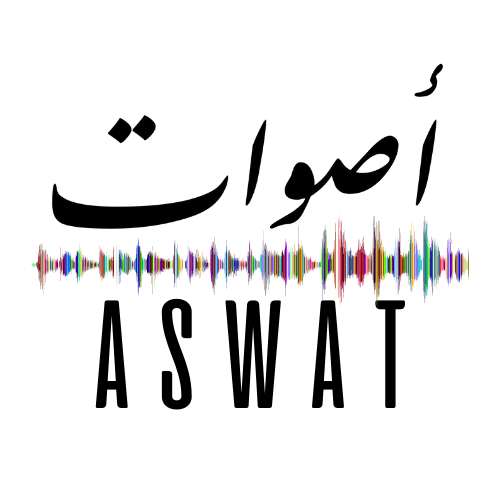Manifestations scientifiques
Abonnez-vous à la … Subscribe to the Mailing list :

ASWAT
Le jeudi 20 janvier 2022 à 19h00 (heure du Caire), IFAO 
Zār, the Abū al-Ghaiṭ school
Kawkab Tawfik
Partenaire(s) de l’Ifao : Cedej et IFE
Langue : anglais.
The second session of the seminar ASWAT organized by the CEDEJ, the IFAO and the IFE will be presented by Kawkab Tawfik (IFAO-CEDEJ) who will introduce the Zār Abū al-Ghaiṭ tradition along with introducing the musicians and members of the Ṭarīqa Aḥmadiyya Ġiṭāniyya, represented by Mohammed Abuzeid and the Abū al-Ghaiṭ Ensemble who will perform the music repertoire of their heritage.
The Zār of Abū al-Ghaiṭ is a very unique model of cultural, religious and music syncretism. Developed between the 19th and 20th centuries in the Delta of Egypt from the Sudanese and Upper Egyptian zār cult, it is carried on by the sufi Ṭarīqa Aḥmadiyya Ġiṭāniyya. This Ṭarīqa is founded by the dervish Sheikh Hassan Abu al-Ghait who combined the zikr with the zār practices in the Abū al-Ghaiṭ village and Qalyubiya Governorate. The descendants of the sufi saint are still keeping the zār tradition alive, holding the legacy of their ancestor. They merge sufi textual and music repertoire to the zār rhythms and play zār songs with instruments belonging to the Egyptian religious tradition: the drums table and naqrazān, the frame drums mazhar and ḥāna, with a strong role of the ṭūra (cymbals) and the kāwālā (Egyptian single reed flute). During the zār ritual, a small ensemble is set around the practitioner who dances following the beat, considered the breath of the possessing spirit. Dancing on a progressively speed-increasing beat, the possessed person can enter in connection with the spirit, appease his/her anger and end the conflict that caused the illness which the practitioner was complaining of.
Attendence on registration, please fill the registration form linked here to attend.
About the musicians:
The musicians of the Abu al-Ghait Ensemble are sufi practitioners of the Ṭarīqa Aḥmadiya Ġiṭāniya, founded by the dervish Sheikh Hassan Abu al-Ghait who, in the XIX century, combined the zikr with the zār practices in the Delta of Egypt. The descendants of this sufi saint, are keeping the zār tradition alive, holding the legacy of their ancestor. Mohammed Abuzeid, the ensemble leader, is hosting weekly the last hadra al-zār in the areas of Cairo and Delta, struggling for the survival of his family’s tradition. Moreover, being a follower of the Abu al-Ghait’s school requires music skills and practice. While in their private life they carry out zikr and zār activity, many members of the ṭarīqa are actually recognized as well-known musicians and belong to governmental cultural institutions; they perform sha‘bī music in ensembles like Firqat al-Nīl and Firqat al-Ṭannūra; or are professional dancers of ṭannūra at national dance troupes of the Ministry of Culture.
- Mohammed Hussein Abozeid: tabla, kawala, chorus
- Salim Atallah Ghamri: main voice, naqrazan
- Sabry Hussein Abozeid: kawala, hana, chorus
- Hazem Sayyed Abosirya: hana, naqrazan, chorus
- Abdelatif Hussein Abdelatif: mazhar and saghat, chorus
- Abdelfattah Mohammed Higab: mazhar, chorus
- Walid Salama: hana, chorus

ASWAT
Sounds - and music - are able to shape individual and collective identities, define spaces and borders, denote cultures, transmit knowledge and influence style lives.
ASWAT is a series of music meetings and music performances focusing on Egyptian culture(s) of music that seeks to explore a range of musical practices across Egypt, and beyond, through the contribution of academic speakers and music makers, followed by a concert. The meetings will offer the opportunity to deepen some historical, religious, social and musicological aspects that interwoven in, and from, the Egyptian music heritage, addressing creation, performance and reception practice.
Aswat is a joint initiative from CEDEJ, IFAO supported by IFE.
Les sons - et la musique - sont capables de façonner les identités individuelles et collectives, de définir les espaces et les frontières, de dénoter les cultures, de transmettre les connaissances et d'influencer les styles de vies.
ASWAT est une série de rencontres et de spectacles musicaux axés sur la ou les cultures musicales égyptiennes qui vise à explorer un éventail de pratiques musicales à travers l'Égypte, et au-delà, grâce à la contribution de conférenciers universitaires et de musiciens, suivie d'un concert. Les rencontres seront l'occasion d'approfondir certains aspects historiques, religieux, sociaux et musicologiques qui s'entremêlent dans et à partir du patrimoine musical égyptien, en abordant les pratiques de création, d'interprétation et de réception.
ASWAT est une initiative conjointe du CEDEJ et de l'Ifao soutenue par l'IFE.


